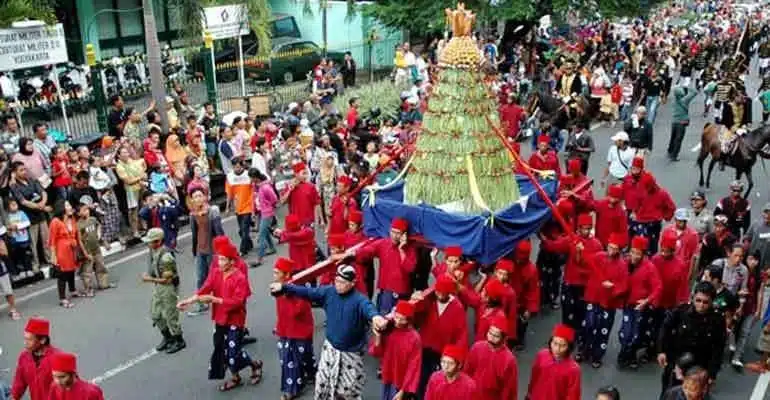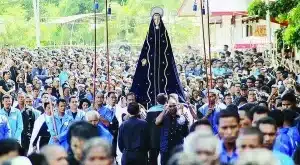Sacred rhythms: Maulid festival and Islamic heritage in Java are at the heart of a unique cultural and spiritual tradition in Indonesia. The island of Java, home to ancient civilizations and a crossroads of religious influences, offers an unforgettable experience for travelers seeking meaning, history, and human connection. Every year, thousands of Javanese—devout or curious—gather to celebrate the birth of the Prophet Muhammad in an atmosphere of deep devotion, traditional music, and living heritage.
A Celebration Rooted in Javanese History
The Maulid festival, celebrated on the 12th day of Rabi’ al-awwal in the Islamic calendar, was introduced to Java in the 15th century by the Wali Songo, the nine revered saints who spread Islam across the island. Their mission was not just religious—it was cultural. Rather than replacing existing beliefs, they integrated Islamic teachings into Javanese traditions.
Thus, sacred rhythms like the gamelan music, sholawat chants, ritual dances, and parades became expressions of spiritual devotion. In Java, Islam was not imposed; it was harmoniously woven into the existing cultural fabric, creating a rich and tolerant religious identity.
Gamelan Sekaten: The Sound of the Sacred
A highlight of the sacred rhythms: Maulid festival and Islamic heritage in Java is the performance of Gamelan Sekaten, a special gamelan orchestra played only during the Maulid celebration. Preserved in royal palaces such as those in Yogyakarta and Surakarta, these instruments are considered sacred. Their deep, slow vibrations are believed to cleanse the soul and bring people closer to divine presence.
These performances attract large crowds and reflect how art, spirituality, and cultural memory merge during Maulid.
Maulid Rituals: Between Faith and Festivity
The Maulid festival in Java includes public processions, collective prayers, Quran recitations, and artistic performances. A unique ritual is the Gunungan parade—mountains of food offered by locals to symbolize divine abundance and shared at the end in a spirit of togetherness.
Children parade in traditional clothing, sing qasidah, and poems glorifying the Prophet are read in both Arabic and Javanese. The combination of devotion and festivity is a hallmark of Javanese Islamic heritage, known for its tolerance and aesthetics.
Spiritual Heritage Sites in Java
Traveling to Java during the Maulid festival is also an opportunity to explore significant Islamic sites:
-
The Great Mosque of Demak, built in the 15th century, reflects the fusion of Islamic and Javanese architectural styles.
-
The tomb of Sunan Kalijaga in Kadilangu is a spiritual center and pilgrimage site.
-
The Kraton (Palaces) of Yogyakarta and Surakarta continue to host Maulid ceremonies under royal patronage.
These landmarks illustrate how Islam took root in Java not through conflict, but through adaptation and cultural dialogue.
Traditions Preserved by the Youth
Even in modern times, Maulid festivals and Islamic heritage in Java are vibrant. Youth are involved in learning sacred dances, playing gamelan, and reciting religious poetry. Islamic boarding schools (pesantren) hold theatrical and musical performances during Maulid as part of religious education.
These traditions are also shared through social media and digital storytelling, helping the world discover Java’s cultural treasures.
Why Join Maulid Festivities During Your Java Trip?
As a foreign traveler, experiencing the Maulid festival means participating in an authentic cultural moment. You will be welcomed to join in rituals, taste traditional foods like nasi tumpeng and kolak, and engage in enriching conversations with local communities.
Instead of a standard tourist experience, exploring the sacred rhythms: Maulid festival and Islamic heritage in Java offers meaningful encounters with living traditions.
Practical Travel Tips
-
When to go? Dates change each year based on the lunar Islamic calendar. Travel agencies can help you plan.
-
What to wear? Modest clothing is encouraged when attending religious events.
-
Who to travel with? Local guides or agencies with cultural expertise enhance your experience.
A Legacy to Preserve
Java’s Islamic culture is a beautiful example of how traditions can evolve while preserving their core values. It serves as a living testimony to harmony between faith and art, past and present.
Conclusion
Let yourself be immersed in the sacred rhythms: Maulid festival and Islamic heritage in Java and discover a unique side of Indonesia through sacred music, vibrant ceremonies, and heartfelt encounters.
Bali Ethnik, your Indonesian travel agency, offers personalized cultural tours to Java that will connect you to the roots of its Islamic heritage in a respectful and meaningful way.
Contact Bali Ethnik today and begin your journey into Java’s sacred rhythms!





